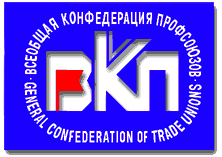
The World Federation of Trade Unions (WFTU) is an international federation of trade unions established in 1945. Founded in the immediate aftermath of World War Two, the organization built on the pre-war legacy of the International Federation of Trade Unions as a single structure for trade unions world-wide, following the World Trade Union Conference in London, United Kingdom.

The French Confederation of Christian Workers is one of the five major French confederation of trade unions, belonging to the social Christian tradition.

The Norwegian Confederation of Trade Unions is a national trade union center, decidedly the largest and probably the most influential umbrella organization of labour unions in Norway. The 21 national unions affiliated to the LO have almost 1,000,000 members of a Norwegian population of 5 million. The majority of affiliated unions organizes traditional blue collar workers, but the largest affiliate is the Norwegian Union of Municipal and General Employees which makes up more than a third of all members. LO is affiliated to the ITUC and the ETUC.
A national trade union center is a federation or confederation of trade unions in a country. Nearly every country in the world has a national trade union center, and many have more than one. In some regions, such as the Nordic countries, different centers exist on a sectoral basis, for example, for blue collar workers and professionals.

The Confédération nationale du travail is a French anarcho-syndicalist union.

The General Confederation of Trade Unions or GCTU is an international trade union confederation. It was founded on 16 April 1992 and incorporates members from the Commonwealth of Independent States.
Akademikerne – The Danish Confederation of Professional Associations Danish: Akademikerne was founded in 1972 and a national trade union center for 25 Danish trade unions.

The General Federation of Trade Unions (GFTU) is the sole national trade union center in Syria, it was founded in 1948. By a 1968 decree establishing a single-trade-union system, all trade unions in the country are required to be affiliated to the GFTU, and the GFTU has the power to dissolve the executive committee of any union.

The Taiwan Confederation of Trade Unions is a national trade union center in Taiwan. It was established in 1997, but did not receive official recognition from the government until May 1, 2000.

The Tunisian General Labour Union is a national trade union center in Tunisia. It has a membership of more than one million and was founded January 20, 1946.

The Confederation of Public Employees' Trade Unions is one of the four major national trade union centers in Turkey. It was formed in 1995.
Trade unions in Albania have had an unstable existence in recent decades, mirroring the regional political turbulance in Albania. Since the 1991 defeat of the Albanian Party of Labour (APL), independent trade unions have asserted themselves, with two main national trade union centres; the United Independent Albanian Trade Unions (BSPSh) and the Confederation of Trade Unions (KSSh).
Trade unions in Azerbaijan are governed under the Act on Trade Unions (1994) and the Labour Code (1999). Trade unions may be formed with seven or more members, although those in military service or in management positions may not form unions. The constitution provides for a right to strike, although essential services are excluded from this right. Trade unions are prohibited from carrying out political activities and may not associate with political parties or receive finances from political parties. The International Trade Union Confederation (ITUC) notes, "such a general prohibition is deemed contrary to the principles of freedom of association." The Azerbaijan Trade Union Confederation (ATUC) is the sole national centre.
The Ministry of Employment and Labor announced on December 30 2021 that as of 2020, 14.2% of workers were in trade unions in South Korea, a 1.7% increase from 12.5% in 2019. Korea's unionization rate peaked in 1989 at 19.8% and fell to 10% 2004.
The Confederation of Free Trade Unions of India is a trade union confederation in India. N. Kanaka Rao is the general secretary of CFTUI. CFTUI became a full member of the World Confederation of Labour in 1999. In 2003 the then CFTUI president Ashok Kumar Trivedi was assassinated.
The Confederation of Vocational Unions is a national trade union center, an umbrella organization of labour unions in Norway.
Trade unions in Norway first emerged with the efforts of Marcus Thrane and the formation of the Drammen Labour Union in 1848 which organised agricultural workers and crofters. However, with Thrane's imprisonment and the suppression of the union in 1855, it was not until 1872 before a union was founded again, by print workers. In 1899 the first national federation, the LO, was founded. During this period interactions with trade unions in Denmark and Sweden played a great influence over the development of trade unions in Norway.









